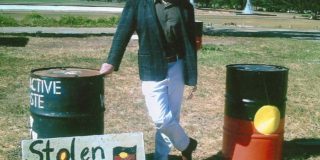Australia is a signatory to two important international anti-corruption conventions: the United Nations Convention against Corruption (entered into force 14 December 2005) and the Organisation for Economic Cooperation and Development (OECD) Convention on Combating Bribery of Foreign Public Officials (entered into force 15 February 1999). In 1999, the Commonwealth Parliament passed the Criminal Code Amendment (Bribery of Foreign Public Officials) Act to implement Australia’s obligation under the OECD Convention.
The preamble to the United Nations Convention against Corruption states that the parties to this convention are:
Concerned about the seriousness of problems and threats posed by corruption to the stability and security of societies, undermining the institutions and values of democracy, ethical values and justice and jeopardizing sustainable development and the rule of law,
Concerned also about the links between corruption and other forms of crime, in particular organized crime and economic crime, including money-laundering,
Working hand-in-hand with the United Nations Convention against Corruption is the OECD Convention on Combating Bribery of Foreign Public Officials, which establishes legally binding standards to criminalise bribery of foreign public officials in international business transactions and provides for a host of related measures that make this effective. It is the first and only international anti-corruption instrument focused on the ‘supply side’ of the bribery transaction.
New South Wales, Queensland and Western Australia are the only states to have specialised bodies to deal with corruption. Public regulatory bodies are notably absent in other Australian states and territories. There is also no statutory Commonwealth anti-corruption body. The Ombudsman has expressed concern that his Office has the sole responsibility for investigations into corruption allegations (Commonwealth Ombudsman Annual Report 2003-04), “In the absence of anti-corruption commissions.”
This lack of specialised bodies to deal with corruption at the Commonwealth level is something that should be of concern to all Australians, especially when we consider the preamble to the report prepared by Barry Hindess from Australian National University (ANU) research school for the social sciences for the Democratic Audit:
“However carefully it might be defined, the actual incidence of corruption will be difficult to determine with any degree of precision, in part because many of those involved in corrupt conduct will have a clear interest in keeping it hidden. Yet there will also be cases in which some of those involved in corrupt conduct will have an interest in advertising the fact. Indeed, if corruption is an abuse of power, then the flaunting of corruption might be seen as an affirmation of power, of one’s ability to get away with such behaviour.” Hindess, B. (2004). “Corruption and democracy within Australia”
In addition to what is traditionally thought of as corruption, Sawer, Abjorensen and Larkin in their book Australia: The State of Democracy point out that “institutional corruption”, corrupt action for political gain, is widespread. Reforms are required to campaign finance and regulation of the use for political purposes of allowances to sitting members of parliament.
The concerns I have been raising on Blak and Black regarding the disappearance of the letter written by the former Commissioner for ACT Revenue to the Chief Minister of the ACT, Mr. Jon Stanhope, advising him that there had been a systematic break down in accountability within the ACT Public Service resulting in the theft and transfer of one hundred and thirty million dollars ($130,000,000) from the ACT Home Loan Portfolio to the Australian Labor Party (ALP) takes on new importance when read in conjunction with the observations made by Sawer et al regarding “institutional corruption”.
Australia and Transparency International
Australia has a good record of anti-corruption performance on the international scales designed by Transparency International. However, Transparency International does criticise Australian law for its low and ineffective penalties for corruption and found in its 2009 report that Australia made “little or no effort” to enforce the OECD Convention on Combating Bribery of Foreign Public Officials in International Business Transactions.
What Australia also does not have a good track record for is dealing with information provided under the Public Interest Disclosure Acts of the Commonwealth, States and Territories. Public Interest Disclosure (PID) legislation, colloquially known as ‘wistleblower’ legislation, provides a mechanism for people with knowledge about corruption to pass that information onto the relevant authorities while being provided with certain statutory safeguards. This sounds all well and good, but what are the realities?
The $130,000.000.00 that I mentioned above was the subject to a PID. Instead of dealing with the issues contained in the PID the ACT Department of Treasury entered into a scheme to pervert the course of justice, sack the ‘wistleblower’ and continue on their own merry way. Involved in the fit-up of the former Commissioner for ACT Revenue were the Australian Federal Police, the same police service that have been caught by the court system in fitting-up Mr Fred Martens who spent nearly three years in jail for a crime he did not commit, Ms Jill Courtney.
Jill Courtney is suing the NSW and Australian Federal Police for up to $2 million, alleging there was never enough evidence for her to be arrested and held in custody on terrorism charges.
A statement of claim lodged in the Supreme Court says Ms Courtney’s arrest in 2006 was “without justification or reasonable excuse and was motivated by malicious intent”. She is suing for false arrest and imprisonment and seeks exemplary damages.
She was charged and pleaded not guilty to conspiring to plant a bomb, possibly in Kings Cross, to murder persons unknown. The conspiracy case relied on tapped phone calls. However, after a 12-day hearing in 2008 in the NSW Supreme Court, Justice Peter Hidden directed the jury to acquit her.
He said the evidence against her was “deficient” and the content of phone taps could never have risen “above the level of suspicion”.
It is the same police service that has been accused by the Portuguese Secret Service of fomenting civil unrest in East Timor in 2006 to further Australia’s commercial interests.
It is the same police service that, through its connection to Detachment 88, is vicariously involved in the torture and murder of West Papuans.
It is the same police service that is currently witnessing one of its own, Mr. Mark Standen, standing trial in the NSW Supreme Court for conspiracy to import $130,000,000.00 worth of the precursor for making speed.
It is the same police service that is accused, along with other elements that comprise RAMSI, of fomenting political unrest in the Solomon’s to further Australia’s commercial interests yet again.
It is the same police service that, in a death bed confession, Mr. Aripaea Salmon accused of tampering with evidence and witnesses in the Julian Moti affair, former Attorney-General of the Solomon Islands and an outspoken opponent of RAMSI.
Just remember if the Australian Federal Police can fit up:
- Mr. Martens;
- Ms. Courtney;
- Dr. Muhamed Haneef;
- Mr. Mamdouh Habib;
- Members of Ananda Marga;
- Mr. Moti QC; and
- The former Commissioner for ACT Revenue.
Can interfere with democratically elected governments in:
- East Timor; and
- The Solomon Islands.
Can become involved in the importation of drugs from:
- Pakistan;
- Colombia; and
- The Netherlands.
Can aid and abet racists not only within its own ranks, but those who work for:
- The ACT Department of Treasury;
- Elected Members of Parliament;
- Ernst and Young; and
- The Department of Public Prosecutions.
Still being investigated are allegations that:
- The Australian Federal Police murdered one of their senior colleagues; and
- Issues relating to their deployment in Afghanistan.
Imagine what damage this police service has done and continues to do to Australia’s democracy. If it can happen to all the people mentioned above, it can happen to you too!


